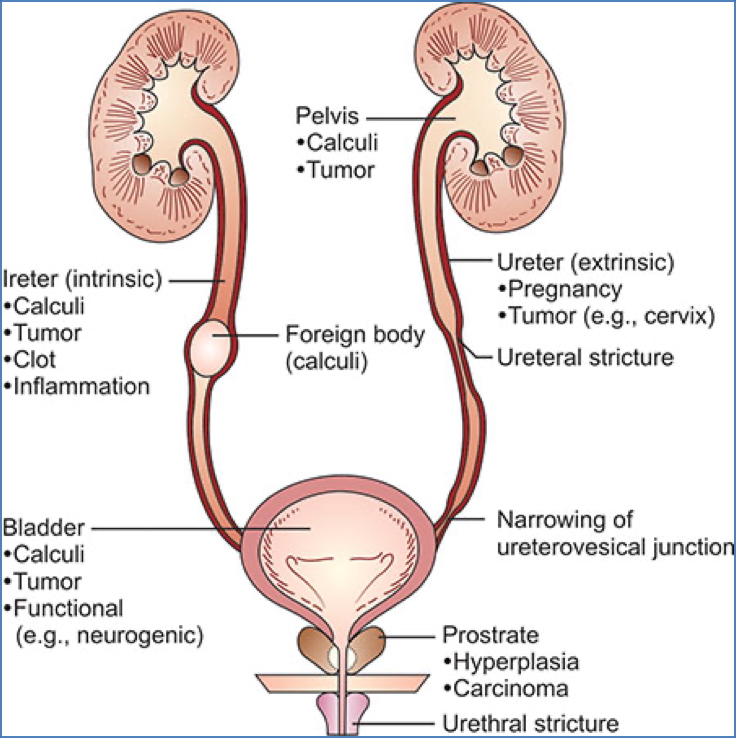Table of Contents
Overview – Post-Renal Failure
Post-renal failure is a type of acute kidney injury (AKI) caused by obstruction of urine flow anywhere from the renal pelvis to the urethral meatus. The resulting back-pressure leads to hydronephrosis, increased intra-renal pressure, and reduced glomerular filtration. Post-renal failure is often reversible if the obstruction is promptly identified and relieved, making early recognition critical in clinical settings.
Definition
- Post-renal failure is defined as renal dysfunction secondary to urinary outflow obstruction.
- It can affect one or both kidneys depending on the site and extent of the blockage.
Aetiology
Any condition that impedes urine drainage from the kidneys:
- Renal pelvis/ureteric obstruction:
- Calculi (nephrolithiasis)
- Papillary necrosis
- Tumour
- Ureteric stricture
- Bladder-level causes:
- Neurogenic bladder
- Bladder tumour
- Clot retention
- Prostatic causes:
- Benign prostatic hyperplasia (BPH)
- Prostate cancer
- Urethral obstruction:
- Stricture
- Urethral carcinoma

Pathophysiology
- Urinary obstruction → urine backs up into the kidney
- Leads to hydronephrosis → elevated intra-tubular pressure
- Compression of delicate glomerular filtration system
- Reduced renal blood flow → ischaemia
- Progressive tubular atrophy and fibrosis
- Common obstruction points:
- Renal pelvis
- Ureter (especially as it enters the pelvis)
- Bladder outlet or urethra
Clinical Features
- Severe flank pain (e.g. from renal stones)
- Nausea and vomiting
- Suprapubic discomfort (bladder outlet obstruction)
- Oliguria, without signs of dehydration
- May present with symptoms of a concurrent UTI
Investigations
- Bladder ultrasound:
- Shows increased post-void residual volume
- Blood tests:
- Elevated creatinine and urea
- Electrolyte disturbances (e.g. hyperkalaemia)
- Urinalysis:
- May reveal pyuria or haematuria in the setting of infection or trauma
Complications
- Urinary tract infection (UTI):
- ↓Urethral flushing predisposes to bacterial overgrowth
- Symptoms: fever, pyuria, haematuria
- Prolonged obstruction:
- Can lead to irreversible kidney damage
- ↑Creatinine, ↑Urea, electrolyte imbalance
Management
- Urgently relieve the obstruction:
- Catheterisation (e.g. for BPH)
- Ureteric stenting or nephrostomy (for upper tract obstructions)
- Fluid restriction to prevent overload
- Treat any infections with appropriate antibiotics
- Monitor renal function and electrolytes closely post-relief
Summary – Post-Renal Failure
Post-renal failure is a reversible form of acute kidney injury resulting from urinary tract obstruction. Prompt recognition and relief of the obstruction are essential to prevent long-term renal damage. Common causes include stones, strictures, neurogenic bladder, and prostate enlargement. For a broader context, see our Renal Overview page.